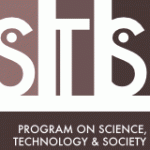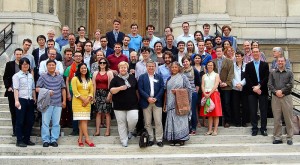Du 25 au 27 juin 2012, le Science and Democracy Network (SDN) de l’université d’Harvard a tenu sa onzième conférence annuelle à Paris. L’IFRIS a eu l’honneur d’accueillir cette conférence dans les locaux du CNAM.
Session 1 – Europeanization in the move
- Brice Laurent (Centre de Sociologie de l’Innovation – Mines-ParisTech, France)
Making European objects, constructing the European space of “responsible innovation”
- Emanuel Bertrand (Centre Alexandre Koyré, France)
The participation of organized civil society as seen by the European Commission
- Henri Boullier (LATTS / Paris-Est University and IFRIS, France) et Pierre-Benoît Joly (INRA SenS and IFRIS, France)
Epistemic Subsidiarity and European Integration: Lessons from European governance of GMOs and chemicals
Session 2 – The politics of nature
- Les Levidow (Open University, United Kingdom) et TheoPapaioannou (Open University, United Kingdom)
Promoting ‘sustainable bioenergy’ through socio-technical imaginaries: UK state bodies shaping and legitimizing technoscientific pathways
- James Palmer (University of Cambridge, United Kingdom)
Identifying and interpreting policy-relevant knowledge in the face of wicked problems: The case of biofuels and indirect land-use change in Europe
Session 3 – Biopolicies, bioidentities
- ShaiLavi (Tel Aviv University, Israel) et SkyGross (Tel Aviv University, Israel)
Kosher Brain Death: A Clash of Medical, Lay and Rabbinic Optics in Israel
- Melike Sahinol (University of Duisburg-Essen, Germany) et Emre Sünter (Middle East Technical University, Turkey)
Shifting science and technology by changing conceptions of religion and science in the case of ‘tüp bebek’ (‘tube baby’)”
- Sang-Hyun Kim (Hanyang University, South Korea)
The Politics of Bioethics in South Korea
- Alessandro Blasimme (Inserm / Université Paul Sabatier Toulouse III, France)
Borders of validity: contesting epistemic and regulatory authority in stem cell innovation
Panel discussion – STS and Law
- Rafael Encinas de Munagorri (Université de Nantes, France), Stéphanie Lacour (CECOJI, CNRS, France) et Olivier Leclerc (Université Paris Ouest-Nanterre La Défense, France)
“Legal Scholarship and Science and Democracy Network: How to Contribute?”
Session 4 – Science, Technology and their publics
- SujathaRaman (University of Nottingham, United Kingdom)
Making Science Public
- Young-GyungPaik (National Open University, South Korea)
Changing Regimes of Public Health and the Politics of Medical Knowledge in Contemporary South Korean HPV Vaccination Campaigns: A Challenge to Social and Health Activism
- HelenPallett (University of East Anglia, United Kingdom)
A decade of learning about public participation and climate change: institutionalising reflexivity?
- Mads Dahl Gjefsen (University of Oslo, Norway)
Establishing sociotechnical coal-collectives in Europe
Session 5 – Scientific Expertise in crisis
- Hideyuki Hirakawa (Osaka University, Japan) et Masashi Shirabe (Tokyo Institute of technology, Japan) (Voir la vidéo)
Double marginalization of Science and Democracy: Politics in the Risk Discourse on the Radioactive Risks in Japan
- Javiera Barandiaran (University of California Berkeley, USA) et Manuel Tironi (Pontifical Catholic University, Chile)
Expertise in crisis: the politics of choosing energy sources in Chile
- Christophe Bonneuil (Centre Alexandre Koyré, France), Jean Foyer (Institut des sciences de la communication du CNRS, France) et BrianWynne (Lancaster University, United Kingdom)
Molecular imperialism: the cultural politics of seeing and not seeing transgenes in Mexico
Session 6 – Institutions and Knowledge
- JennyAndersson (Sciences Po, France) et Anne-GreetKeizer (Scientific Council for Government Policy, Netherlands)
Governing the future. Institutional responses to problems of long term development in the Netherlands and Sweden
- Alfred Moore (University College Cork, Ireland)
Epistemic disobedience
- Sebastian Pfotenhauser (Massachusetts Institute of Technology, USA)
Understanding “best-practice transfer:” MIT’s international partnerships and the universalist assumptions of innovation
- Adrian Ely (SPRU – Science and Technology Policy Research, United Kingdom)
Backward-mapping: a tool for comparing civic epistemologies in multi-level studies of regulatory harmonisation?
Special session on Digital Platform for STS
- Marc Barbier (INRA SenS and IFRIS, France) et Jean-Philippe Cointet (INRA SenS and IFRIS, France)
Reconstruction of Socio-Semantic Dynamics in Sciences-Society Networks: Methodology and Epistemology of large textual corpuses analysis
Public Event: Science, Law and Democracy
- Marie-Angèle Hermitte(CNRS – EHESS)
- Sheila Jasanoff (Harvard University – Responsible for the Science, Technology and Society Programme)

